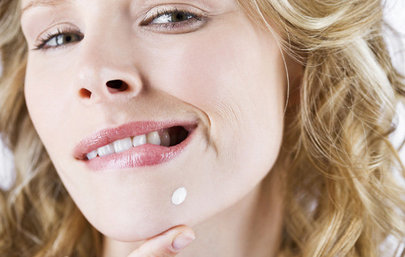 Is PMS ever normal? Is PMS ever normal? I had a new patient come into my office this week. A lovely, sweet young woman, she was concerned about her fertility and hormone health because since coming off the Pill, she felt "like a crazy person" 3 weeks of the month. She sat in my office and said "It's not enough. It's not fair that I only get one good week a month. What am I doing wrong?" She is right. So many women believe they have to put up with their periods. The cramps, the mood swings, the bloating (although in my books, you NEVER need an excuse to wear comfy pants!), the crappy libido... we're often told that we just need to suck it up. If we're expecting to have an average of 450 menstrual cycles throughout our lifetime (minus pregnancies) it is simply not enough to put up with feeling awful. The first step is information. Our sex-ed classes often focus so much on STI and pregnancy prevention (thankfully that's changing) and dry biology lessons that fail to teach young girls how to read their body's clues. Here's what IS normal:
Hormonal imbalances like low thyroid function, anxiety (YES, this can be caused by hormones!), heavy periods... or periods that have gone MIA or are ridiculously painful, infertility and mood swings from hell are NEVER normal. These things are common, but certainly not normal. A healthy woman that eats well, exercises the right amount for her body, gets enough rest (this is NOT just Netflix time), quality sleep and generally takes care of her body should not be experiencing these things. And she knows it. Masking it with medication is not the answer. Nor is powering through it for yet another awful cycle, or being told that she's crazy for asking questions about her ahead or being irrational or a hypochondriac. The answer is HONESTY. Has "everything" really and truly been tried? Consistently tried? For how long? If she is still drinking coffee like a Gilmore Girl or wine like a leading lady on Sex & The City, staying up too late or pretending that everything is OK because she's on the Pill "to regulate" per periods we're not being honest. Honesty with your health care provider should look like open communication, a commitment to lifestyle and dietary factors FIRST and if things are not improving, looking at the right tests. Looking outside the box where necessary. Consistent follow up and frank discussions about what is normal, what isn't. A completely personalized approach to fit YOUR needs. Coming from a 15+ year personal history of hormonal issues that resulted in so many missed periods, crazy hair loss, weight gain and terrible acne, I WISHED a physician back then would have taken this approach with me. Not that anyone was negligent... far from it. Most just didn't have the right tools. This same progressive approach that I take with women every. single. day. in my practice. The person-centred, I-actually-give-a-damn-about-you approach that helps you get back your cycle, get pregnant, age with grace, keep your sex drive and grow into the (boss) lady you are meant to be... it WORKS. If you are experiencing anything else, you may have a subtle.. or more obvious.. hormone imbalance. Your period should NOT be a nightmare. Let me help. Set up a complimentary Health Discovery Session with me. I love this video. Keep in mind that many of the symptoms we consider "normal" like bloating, acne and moodiness CAN be modified with an individualized Naturopathic plan to keep you feeling at the top of your game.
0 Comments
 Your body is ALWAYS trying to communicate with you. The problem is that most of us get so busy that we forget how to listen… so our body needs to scream to get us to pay attention. I hear it all the time. “But Dr. Keila, I’m pretty healthy..”! Meanwhile, you may be taking a few prescription medications to control your blood pressure, thyroid and that random rash that comes and goes. TUMS are in your medicine cabinet and you carry Tylenol in your purse all the time. But that’s all normal, right? Nope. Not at all. There is a BIG difference between common and normal. Common is taking a few prescription medications, having digestive issues and bad knees. Normal is having a good night’s rest, waking with energy and not requiring caffeine. Normal is being able to eat food without feeling awful afterwards, and almost never getting heartburn or headaches. Big difference. Sometimes our body needs a reset. To clear the clutter and figure out what actually is going on. Here are 10 major signs your body is not functioning “normally” (even though they may be common!).
A good detox should help you address all of these things. It is not meant to “fix” things, but to help your body reset and tune out some of the noise so that you can actually figure out what the heck is going on. Do any of these sound like you? Comment below! If you are tired of these common, but definitely NOT normal signs, here’s three free you can do:
If you found this article interesting please share. In health,
Food can be the perfect medicine... or the best poison.Our body does the best it can and can only run off the fuel we give it. While most of us try to eat healthily the majority of the time, sometimes the "good" foods we are regularly recommended can make us feel ill. If we are taking in foods that don't agree with us, regardless of which Food Guide or expert recommends them, our body will mount a reaction in order to tell us that we shouldn't eat it. If we continue to consume these foods, the body turns up the dial until we have to listen. Your Cheat Sheet to Food Reactions:
Timing is everythingOne reason it can be so difficult to identify a food reaction is that we may react hours, days or even weeks after ingesting the food in question. If you tend to eat a highly varied diet or eat the same foods over and over, pin-pointing that one meal can be a challenge, particularly if you started to feel crummy a few days later. Trust your gut..but look for other clues.The gut is the gateway to the rest of the body. If a food reacts in our gut, it impacts not only our digestive function, but the rest of our body as well. In particular, the immune system, neurological and reproductive systems get involved. Symptoms of a food sensitivity can include:
Your symptoms may evolve over time as well. For example, I notice with myself that when I eat gluten I start to feel very sleepy and have an immediate-onset brain fog. If I continue to ignore my body and eat more - I am the first to admit I am very human and not immune to a fresh slice of bread from time to time - I get some pretty intense stomach cramps and constipation. Since I so seldom eat it, I notice this right away. When I was in university on a tight student's budget, I tended to a lot of pasta (it was cheap, quick and filling) I suffered from debilitating sleep attacks plus all those digestive symptoms, weight gain around the middle and acne. Eventually I realized from trial and error that it was worth spending a few extra bucks, saving the gluten/starch binges for a very occasional treat in order to be more productive, focused, energetic and healthy. As you can see, it certainly goes beyond the digestive system! So how do I know if there's a problem... and what can I do about it?If you're asking yourself this, you've come to the right place!
Working with your family doctor or allergist, standard allergy testing is often recommended to test for IgE-type reactions. Treatment then involves taking an antihistamine (Reactine, Benedryl etc.), epinephrine (eg. carrying an Epi-pen) and/or complete avoidance. However, by now you will realize that IgE reactions are just a small part of the picture. Here is how I treat food reactions:
If you or someone you know is suspects that a food reaction might be contributing to feeling unwell, I would like to offer you a complimentary 15 minute consultation with me to discuss your concerns.  http://vipmobiledayspa.wordpress.com/2013/06/28/super-foods-that-fight-acne/ http://vipmobiledayspa.wordpress.com/2013/06/28/super-foods-that-fight-acne/ Ugh. 7 am. There's a bright red, angry monster that somehow took up residence on your chin overnight and is now staring back at you in the mirror. The beast hurts when you touch it. It is also probably giving you the stink-eye, just in time for your incredibly important interview. I've been there too. As a teen I had acne so bad it covered my face, chest and back. I went through years of antibiotic creams, washes, birth control pills that I never wanted, and Proactive facial care systems that stained all of my mother's towels. I was even on Accutane for two years. A high dose pharmaceutical variation on Vitamin A, Isotretinoin or Accutane, is commonly prescribed for severe cystic acne. While it is known teratogen (meaning that it is known to cause severe birth defects), a less common side effect of the drug is anxiety, depression and even suicidality. Fun times for me, when both me and my high school boyfriend were taking long courses of Accutane. It worked, however it was a pretty dark time and I'm lucky my family was so patient with me. It has since been taken off the market in Canada due to a possible link between use and Inflammatory Bowel Disease. Yikes! Acne vulgaris (the medical, even uglier sounding term) can be caused by a number of concerns, including: Hormonal imbalances - excess testosterone, or excess estrogen, PCOS, puberty, pregnancy/post-partum, menopause hormonal changes Food sensitivities - dairy, gluten, eggs are the most common although there are many other possible culprits, sugar, preservatives Digestive Weakness - low stomach acidity, excess protein (often from conventionally raised animals whose meat is pro-inflammatory and hormone-laden), poor gut flora, recent antibiotic use Medications - corticosteroids, oral contraceptives, anabolic steroids Allergies - cosmetics, chemicals, fragrances, clothing material, detergent Stress - lack of sleep, stress hormones in overdrive, less-than-scrupulous (or overly vigorous) hygiene But I'm not a teenager anymore! While it can be pretty devastating dealing with acne as a teen, most of us grow out of it. However, some people have acne lasting well into their 30's and 40's. Many others are suddenly faced with some angry crops of acne as adults. Several women I see with adult acne struggle to be taken seriously in their professional lives while feeling that that they look like a kid. Acne is not uncommon in the body-building world either, as anabolic steroids, sweaty work-out cloths and high amounts of whey protein powders can contribute to facial and b-acne. In these cases, look to food sensitivities and other environmental factors. Another form of adult acne, Rosaceae, is often related to low stomach acid or or food sensitivities. So what can I do for my adult acne? 1. Ditch the chemical laden products - Check out EWG's Skin Deep Cosmetic Database to determine if your cosmetics and personal care products could be contributing to your symptoms. Pay particular to expensive high-end brands - many of them have some particularly nasty ingredients. 2. Switch to raw honey as a facial cleanser. Full of good bacteria, honey acts as a skin normalizer for both oily and dry skin and promotes healing. 3. a) Limit sugar, dairy and processed foods. Low glycemic diet and acne (American Journal of Clinical Nutrition, 2007), Acne: the role of medical nutrition therapy (Journal of the Academy of Nutrition and Dietetics, 2013) b) Clean up your diet. Focus on lots of orange and yellow fruits and vegetables like carrots, winter squash, and pumpkin as they contain beta-carotene to help improve skin health. Leafy greens such as dandelion, beet greens, spinach, kale, chard, water cress, blue-green algae (spirulina, seaweeds) tonify the liver to help balance hormones. Mung beans, adzuki beans, unpeeled cucumber slices, alfalfa and soy sprouts are all used in Traditional Chinese Medicine for the treatment of acne as well. 4. Drink lots of water and green tea. Your kidneys and liver filter toxins out of your body - staying well hydrated assists this function. 5. Adopt a regular stress management practice. Acne is associated with lower self-esteem, higher and rates of depression - Understanding the burden of adult female acne (Journal of Aesthetic and Clinical Dermatology, 2014). Yoga, deep breathing, and exercise can be helpful for confidence breathing, handling stress and improving your quality of life. Check out Jean's story... this is a great example of how naturopathic medicine can help treat adult acne with amazing results! Naturopathic approaches to acne involve removing food sensitivities, creating a tailored supplement protocol, stress management exercises and hormonal support as needed to help resolve current acne, minimize scarring and reduce the occurrence of future outbreaks. If you are struggling with acne - whether you are a teen or a grandmother or anywhere in between - let's set up a time to chat. Here's to your clear skin! Dr. Keila
Are you overwhelmed trying to find a health care provider that "gets it"? Someone that is legit, not too woo-woo and who cares about you? You'll want to pay close attention if you are looking for a professional with a natural approach.
 Find a doctor that gets it. Find a doctor that gets it.
1. They should be licensed.
Look for somebody with an accredited degree. For example, seeing a Doctor of Naturopathic Medicine, Doctor of Chiropractic, Doctor of Osteopathy, Registered Massage Therapist, Licensed Acupuncturist etc. means that they have completed an undergraduate degree, followed by specialized post-graduate degree and standardized licensing exams. Although there are lots of great weekend courses out there, there is no substitute for a rigorous medical education when it comes to your health. 2. A good referral network and social media following. You want to know that you are in good hands. If friends or family members are having good results with a certain practitioner, ask who they are seeing. Most people are only too happy to recommend their go-to person. Likewise, check for social media involvement - a website that is frequently updated, blog, Facebook, Twitter, YouTube videos etc. etc. show that the practitioner is engaged with current health issues and welcomes patients who are ready to "do the work". A good practitioner also knows when it is time to refer you elsewhere. 3. Experience in treating your concerns... Ask if the practitioner has ever worked with someone who has similar concerns. If there is a positive track-record working with people also experiencing acne, migraines, hypertension, or anxiety (for example) the Naturopathic Doctor probably has tried several different approaches, and has a few favorite strategies in mind. 4. ..and willing to look outside the box for answers. We are all different. What worked for your neighbour's Irritable Bowel Syndrome may not work for you. You want to know that your naturopath won't throw in the towel if the tried-and-trues are not getting you the results that you want. 5. Someone with whom you feel comfortable expressing your concerns, thoughts and opinions. This is by far the most important of all. Regardless of the piece of paper on the office wall, the number of years in practice or how busy the waiting room, you want to feel comfortable. Your naturopath, chiropractor, massage therapist, or acupuncturist should want to know how you are experiencing your symptoms. You should never feel pressured into treatments that you are uncomfortable with or come home with hundreds of dollars in supplements that you don't why you're taking. You should feel free to be honest, express your concerns and get feedback. I have practiced Naturopathic Medicine and acupuncture in Stratford, ON since 2013, and previously at the RSNC, Sherbourne Health Centre and Anishnawbe Toronto. I am licensed with the College of Naturopaths, OAND and CAND. I love working with a wide variety of health conditions in children, teens, men and women have great results with lots of people just like you. My bottom line is that I treat people, not just their disease. If you are looking to improve your health and want the highest quality of care book a Health Doscvery Session to see how I can help you. Dr. Keila Roesner Your Stratford Naturopath |
Top 75 Naturopath Blogs & Websites For Naturopathic DoctorsAuthorDr. Keila Roesner is a Naturopathic Doctor. When not treating patients she is also an enthusiastic barefoot-strolling, music-loving, yoga-doing kitchen wiz - who also happens to be a wrestling fan. Categories
All
|
Let us take you from hormonal to whole.
|
Dr. Keila Roesner, BHSc ND
Naturopathic Doctor, Hormone Warrior and Your Wellness Cheerleader 247 Church Street, Stratford ON N5A 2R7 (519) 273-0900 [email protected] |
|





 RSS Feed
RSS Feed